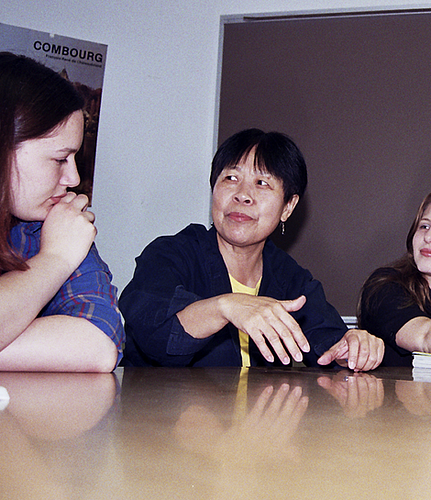
“Be an honest, brave and courageous person,” advised renowned journalist, author and activist Dai Qing to Sidwell students during her presentation on Nov. 2.
To celebrate the 40th anniversary of Sidwell’s Chinese Studies program, the event was a collaborative effort between both the Chinese Studies Department and the Friends Environmental Action Team (FEAT). The club wanted an speaker with diverse experiences and expertise in the environmental movement to share with the Sidwell community. Dai provided an intersection between these two ideas, giving insight into her background as an environmental activist in the age of the Chinese Communist Party (CCP).
Dai, an 82-year-old born and raised in Chongqing, China, is an award-winning journalist. She is the daughter of a revolutionary, a former missile technician and a one-time intelligence agent. Throughout her presentation, Dai detailed her past in China and told stories about being a reporter.
Her best known project was opposing the Chinese government’s plans for the Three Gorges Dam, a hydroelectric gravity dam that spans along the edge of the Yangtze River and downstream of the Three Gorges.
The project’s environmental impacts are vast: it displaced over 1.3 million people living in its vicinity and destroyed miles of habitat. However, Dai explained that even with the dam’s extensive environmental consequences, the Chinese government was more concerned with its political effect.
In 1989, Dai sought to remedy this problem by publishing “Yangtze! Yangtze!” (which translates to “Long River”). She published another book titled ‘The Most Dammed Country in the World” in 2021. The play on words with “dammed” emphasizes both the literal and metaphorical point of her story. Her work inspired opposition to dams across the country, which was critical in pressuring the Chinese government to postpone construction projects.
After the 1989 Tiananmen Square protest and massacre, which Dai attended, “Yangtze! Yangtze!” was officially banned in China. At this point, Dai left the CCP due to their violent actions at the protest.
Imprisoned for 10 months and released in May of 1990, Dai was banned from further publication in China. The government kept her under surveillance and forced her to stay in the country. Dai shared her experience speaking out about her time in prison by publishing another book called “My Imprisonment.” After leaving China, she publicly advocated for ending the Three Gorges Dam project and for other global human and environmental rights issues.
Sophomore Angela Ding said in a written statement that “I thought it was very meaningful to hear her experiences comparing China and the US. It really puts perspective on our lives in America and reminds us to not take freedom of press and speech for granted.”
Sophomore Eyob Sisay, who attended Dai’s presentation, said, “The experience was invaluable. Hearing the experiences of someone who put their own safety at risk for the greater benefit of her community was life-altering. She was a lively, enthusiastic and captivating storyteller.”
In her closing remarks, Dai said the only way to change China is to start from the soil, meaning to create tangible, political change from the ground up.







































